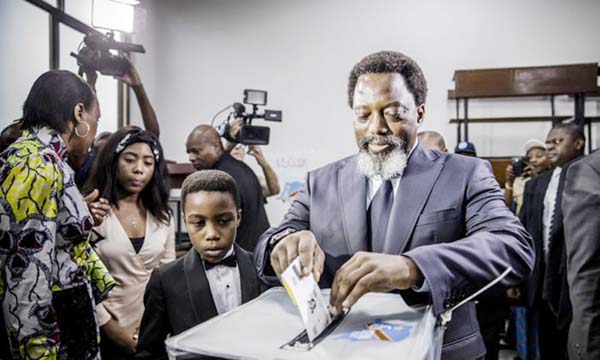
AFP, Kinshasa :
Voters in the Democratic Republic of Congo went to the polls on Sunday in elections that will shape the future of their vast, troubled country, amid fears that violence could overshadow the ballot.
Millions of electors are choosing a successor to President Joseph Kabila, who is stepping down two years after his term limit expired – a delay that sparked bloody clashes and revived traumatic memories of past turmoil.
The vote gives DR Congo the chance of its first peaceful transfer of power since it gained independence from Belgium in 1960.
But analysts say the threat of violence is great, given the many organisational problems and wide-ranging suspicion of Kabila.
The election’s credibility has already been strained by repeated delays, the risk of hitches on polling day and accusations that electronic voting machines will produce a rigged result.
On the eve of the vote, talks between key candidates to avert post-election violence broke down.
Opposition frontrunners Martin Fayulu and Felix Tshisekedi refused Saturday to sign a proposed peace pledge, saying election officials had failed to make suggested changes to the text.
The announcement came after the pair had met with the Independent National Election Commission (CENI) as well as Kabila’s preferred successor, Emmanuel Ramazani Shadary.
The UN, the United States and Europe have loudly appealed for the elections to be free, fair and peaceful – a call echoed on Wednesday by the presidents of Angola, Botswana, Namibia, Zambia and the neighbouring Republic of Congo.
·Polling stations opened in the east of the country a little after their
scheduled time of 0400 GMT and an hour later in Kinshasa and the west.
Kabila voted in the capital along with his family, just minutes before Shadary also cast his ballot in the same polling station.
“I feel liberated, freed,” said Victor Balibwa, a 53-year-old civil servant and one of the first voters to cast his ballot in Lubumbashi, the country’s mining capital in the southeast.
“I’m excited to vote, to be able to choose at last. It’s my first election,” an 18-year-old student named Rachel told AFP in the eastern city of Goma, an opposition stronghold.
Some polling stations opened late in Goma and elsewhere.
In one, electoral officials were still adjusting voting machines and in another a technician needed to restart a machine that had broken down, an AFP reporter saw.
The last polls are due to close at 1600 GMT. Provisional results are due on January 6.
Twenty-one candidates are contending the presidential election, which is
taking place simultaneously with ballots for the national legislature and
municipal bodies.
The frontrunners include Kabila’s champion Shadary, a hardline former
interior minister facing EU sanctions for a crackdown on protesters.

